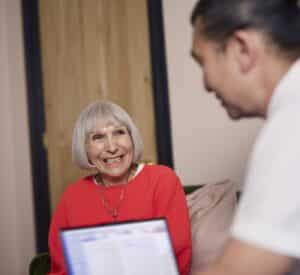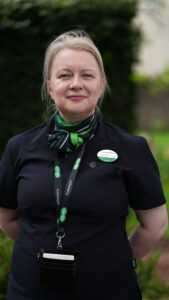Domi – a growing way of audiologists delivering HOMEWARD SOUND
Specsavers domiciliary service is now at 50% coverage, but 2025 is big for the project: the group hopes to reach everyone in its scope this year, expanding very much homeward bound: home where thoughts are skipping and the music’s playing (according to that hearing loss celebrity Paul Simon). So,…
How did the pandemic affect the service? Did it end up boosting it?
Because Specsavers had already been doing optical domiciliary for 11 years when audiology was introduced, “when COVID-19 hit in 2020 we didn’t see a big impact. It aligned to the service we already offer and provided consistency for all our patients”.
Does home service mean greater personalisation?
“Our domiciliary service is bringing the great customer service we already provide in our practices to our patients who are unable to travel. The customer journey reflects the same quality as you would expect in practices, but naturally there is increased personalisation because we are in their home environment. We have to adapt to these differing patient needs and environments, ensuring they feel comfortable.”
Is there an optics domiciliary service from Specsavers?
“Yes, we have provided the optical domiciliary service since 2015.
We typically see around 4,500 customers a week in their home or care home.
Introducing audiology to our domiciliary service allows us to provide simplified service to patients in an environment that may already have lots going on (for example, care homes).”
So, who are the candidates for domiciliary attention?
“We offer our domi service to:
The patient or a loved one who have a condition that stops them from leaving their home unaccompanied due to poor health.
The patient may be housebound or bedbound due to a physical disability.
If patients live in an area where NHS-funded home hearing visits are available, their GP may need to confirm they are registered as housebound, and a formal GP referral may be required.”
Does Specsavers select visiting audiologists from its hearing care professionals? Do they volunteer? Are they recruited specifically? How does this work?

Courtesy of Specsavers
“We have dedicated teams and colleagues who work in domiciliary. When recruiting for our domiciliary work audiologists typically put themselves forward for the role. They want to be able to take the work they do in practice and provide it to those who don’t have the option or opportunity to be able to get into a store for a hearing assessment.
Audiology domiciliary care is a great opportunity for people who like more time to get to know people, to be able to focus on their needs and comfort while performing audiology tests and finding the perfect hearing solution for them, and then return for fitting and aftercare.”
“There are a few avenues we recruit from for domiciliary work:
Partner or Director – similar to our partners and directors in practices, they are a full-time domiciliary audiologist looking after a region.
Audiologist – they work full time within the domiciliary business, with the option to progress to become a partner or a director.
Locum/Practice Audiologist – they have an interest in domiciliary work and would like to learn more about it and see if it suits them. Any practice colleague who works in domiciliary would ensure there is no impact to their working arrangement in practice.1

Lynne Seebaluk, Audiology Domiciliary Partner.
Courtesy of Specsavers
Lynne Seebaluk, Audiology Domiciliary Partner: “If you’re empathetic and a people-person, then I would definitely say becoming a Home Visits Partner could be a great move for you. I recommend going out on a shadow day to see what it’s really like. It’s so rewarding. You’ll put a lot into it, but you’ll get so much back. Not just in terms of the flexibility and work/life balance, but in seeing the difference that you make every single day.”
—-
KIT’S STORY

Kit Reid: “It’s so important for me to stay connected.” Courtesy of Specsavers
Kit Reid, 96, relies on a home visit audiology service.
“I live in sheltered housing in Haddington. We’re totally independent and can come and go as we like but the support is there if we need it. Having Specsavers come to me has really made all the difference. The whole process has been so smooth, and I felt very much at ease. I couldn’t have gone to them – as simple as that! To me, it’s become a social occasion, and I’ve benefitted greatly from it. I’m much happier going into company now, if we’re sitting in a group or at a table. It’s all those little things that I had missed that I hadn’t realised I was missing – it’s like living in a different world.”
—-
What about the day-to-day in this job, the challenges it throws up, the logistical difficulties, remote destinations, and such…? Can one of your audiology domiciliary partners fill us in?
“One day I’ll be in the office, scheduling the next three months in with the Customer Service Partner and the office manager. While you’re on the road, you’ll be supported by a full team, triaging patients and scheduling appointments, so that you can focus on the clinical work that makes a difference in the community.
The next day I’ll be out on clinic – driving anywhere from the coastal routes to Edinburgh city centre. My role involves everything you’d do in practice and with such a great team around me, both in the office and out on the road, I don’t ever feel alone.
We cover a huge area – so there’s a lot of driving and you have to be comfortable with that. It’s beautiful out on the road though and offers you time to breath and think between appointments.
The thing I enjoy most is that you see the difference you make. We visit our patients two or three times a year and as you build a relationship with them, you see the change that happens over time. Every single person has a different story to tell. Getting a hearing aid might mean they simply feel safe in their own home because they can hear the doorbell when someone rings. Many of the people we visit feel lonely or isolated, so it’s heartwarming to know you can make a difference to their day, as well as their hearing.”
From jumping on a ferry to the Isle of Wight, to an appointment on a farm, we will go wherever we need to go. Nothing classes as out of the ordinary. We know that more people need support with their hearing, and so getting to them wherever they are is something we will always endeavour to do.”
How many domiciliary patients per month are being seen and what is the growth forecast?
In 2024 we saw over 10,000 patients in their home or care home, and in 2025 we expect this to more than double with the goal of providing our domiciliary business across the UK and Northern Ireland.
What is the range of services that can be offered at home?

“There’s a lot of driving and you have to be comfortable with that. It’s beautiful out on the road though!”
Courtesy of Specsavers
“We offer the same services to those at home as we do to those who visit us in store. From an initial assessment to understanding the needs and preferences of the patient, to completing a hearing assessment and then finally understanding and working with the patient on next steps. We want to make sure that our patients have the opportunity to receive the same expert care to those who visit us in store.
If a patient requires a hearing device, we’ll ensure this is fitted with the same verification and validation methods as those who visit us in store which will also include aftercare services as and when required. And if the patient has wax present, our clinicians will be able to remove it safely and competently through micro-suction.”
What is the reaction of patients? Does seeing people in their homes – for many, their most regular real-world environments – bring any audiological advantages?
“It’s life changing. Reconnecting our patients back to the outside world, their family and friends is incredible. They are some of our most isolated patients so being able to share their journey with them, in their home environment is truly special.”
How does Specsavers see domiciliary from a purely business POV?
Specsavers priority is total care. We want to be able to provide all our services to everyone throughout their lives. We shouldn’t stop when patients can’t come into the practice anymore, for a reason outside of their control. These patients need us the most.
Domiciliary is a key area into the future and we won’t stop building this service. This is only the start of lots of development.
From Audiology News UK issue 14, May-June 2025